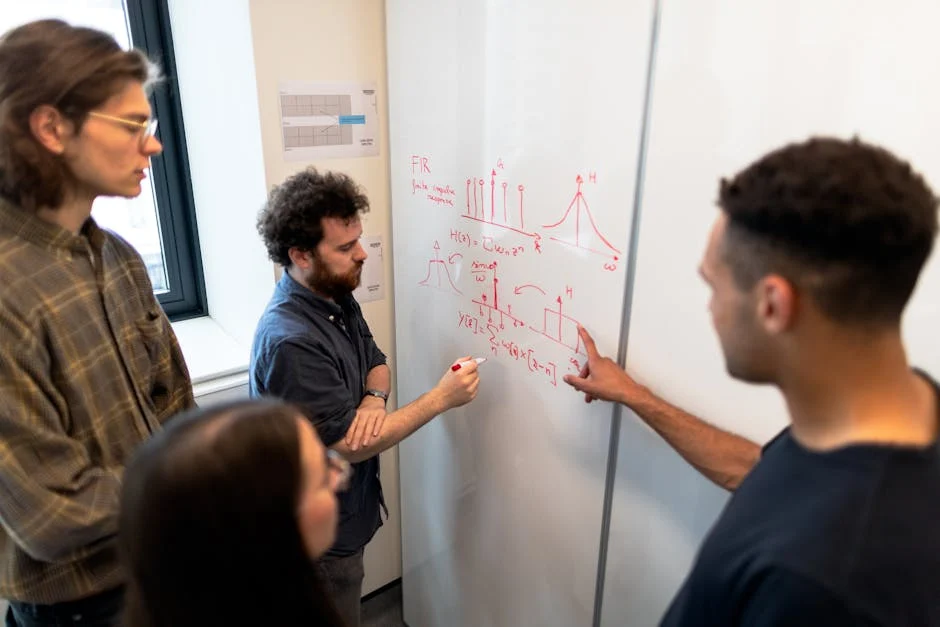 Ben: Hi. I’m Ben. Fitz: I’m Fitz. Ben: We’re going to answer some more questions about working at Google. Fitz: Well, actually we’re going to answer one question.
Ben: Hi. I’m Ben. Fitz: I’m Fitz. Ben: We’re going to answer some more questions about working at Google. Fitz: Well, actually we’re going to answer one question.
Ben: All right. One question. Fritz: Okay. Ben: You’ve got it there on your gad. Fritz: I’ve got it.
It’s ready on my gad. Ben: Excellent. Fitz: Freshly charged. So, here’s the question, “Who approves or rejects the innovative ideas that you have?” And that’s from AncaaEu in Toulouse France.
Ben: It’s interesting, because I think this question sort of assumes a traditional corporate structure, where there’s a chain of command, and you know, orders come down from one person to the other. And if you have an idea, then you have to go through some very formal process up through the chain and down through the chain. (PLR) Google Business Profile with Ai
And that kind of bureaucracy really doesn’t exist here. It’s a very-what would you say? Fitz: Somebody comes up to you, “You!
I want you to have an idea! Right now!” Uh. Ben: No. But it’s a very-it’s a very flat organization at Google.
Fitz: Right. Ben: There is some hierarchy but very little compared to what you would expect. It’s most of the, most of the time, it’s just sort of — someone described it a lot of mad scientists running around trying crazy new things and sort of ideas bubbling up from the bottom. Then you’ve got a very thin middle layer of management and product management, who sort of are noticing the innovations and saying, “Hey, that’s a great idea. Let’s-let’s turn that into a feature or product or something.
” Fitz: Right. Ben: That’s, it’s not a top-down … Fitz: Right.
I want to-I want to… Ben: chain. Fitz: …
sort of actually back up to the idea part.
Ben: Okay. Fitz: I want to debunk the general concept, that ideas are something that are approved or disapproved. Ben: Fitz: I-I- My personal view is that ideas are worthless. 99% of the ideas that come out of anyone, me included, especially me, are just garbage.
I have 20 different ideas walking to work in the morning. Ben: Fitz: The fact of the matter is that what-what really gets to the point where it’s even something to contemplate or “approve” is when you have something that’s fleshed out as an idea, a prototype perhaps, a design document, or, or the opportunity to bounce it off some other people and get some more input on that.
Ben: This goes back to the execution is what matters not just having a thought. Fitz: Right, right. Ben: And even the beginning of execution matters way, way more, right?
Like having a design document, having a demo, having something. Fitz: Right. So if you, if you go up to bunch of folks and say, “Hey, I have this great idea”, then people might be, “Oh, yeah. Well, whatever. Is that possible?
Can you do this?” Once you start to explore it — whether it’s through a quick prototype, which is probably the best way to go, or a design doc., then you’re start-you’re going to start, going to start getting ideas. Is this going to work? Is this not going to work?
Here are some of the hard parts. Here are some of the easy parts. Ben: So by the time you’re actually ready to show it to somebody who really does have the power to say, “Yes, we’ll have some people work on this with you… Fitz: Or we’ll spend more time on this or commit something to this. Ben: You’ve already learned a lot about the problem.
You’ve already got something sort of working so it’s not just a hypothetical, “Yeah, throw a bunch of people at this idea.” Fitz: It comes back to that sort of you never want to do something the first time in front of other people. Ben: Fitz: Right? So, when I-when we went out to interview, right, we knew we were going to have to write code on a white board. So, we sat down with pencil and paper and tried, practiced writing code in pencil and paper. Ben: It makes a big difference.
Fitz: It does. The first time I did it I felt like I’d had a lobotomy, right? You know I was so used to writing a code with my compiler right there to help me out. And so, for, a prototype is a way of sort of getting’ that first shot at it, right. And you can work through some of the hard problems or find out some of the catching points before you go in front of someone and say.”This is my idea; this is my prototype.” Ben: Yeah, that’s — the general process is if you have an idea at Google, and it’s something you feel like you could, you really want to shop around or get approval or get other people to look at, the step, the first thing I would do is I guess I would use my 20% time…
Fitz: Right. Ben: To try and implement. Fitz: Yeah. I agree. Ben: And maybe convince some coworkers around me. “Hey, you winna work on this with me on your 20% time. Let’s band together and see if we can come up with proof of concept.” And then we’ll show… Fitz: Getting more people to buy into that… Ben: Right Fitz: is really important. Ben: So, if you can create like a small group of people who are all doing 20% of something and then you get something that is actually demo able, then you show that to somebody else and then the idea will catch on. And that’s how a lot of projects get started here. Fitz: Yeah.
Ben: It’s not just, ‘I have an idea, I’ll go talk to the VP, and he’ll say yes or no.’ It’s just not that simple.
Fitz: And-and I think a lot of it depends on is this new product, or is this a feature for an existing product?
Because if it’s a feature in an existing product, especially if it’s a product you’re working on it currently.
I think it’s a lot easier to sort of get that ball rolling because you can bounce it off your team, your product manager and see.’Okay, where can we fit this in?’
And then if it’s something you can accomplish in your 20% time, it does make it easier to sort of get that into there.’Cause a lot of the, a lot of the issue in general is that as nice as it would be, engineering resources are finite. So, you’ve gotta pick and choose what’s more important. Is it more important to fix this bug, that’s affecting so many people?
NEW! For Stay at Home Moms!
https://allsolutionsnetwork.com/cgi-bin/d2.cgi/JA72661/signupMOM1.htm
Is it more important to write this new feature? Or is it more important to implement this idea I just came up with? Ben: Cool. Fitz: All right. Ben: I think we’re set.
Fitz: Thanks a lot. Ben: See ya next time. Fitz: Bye-Bye.



